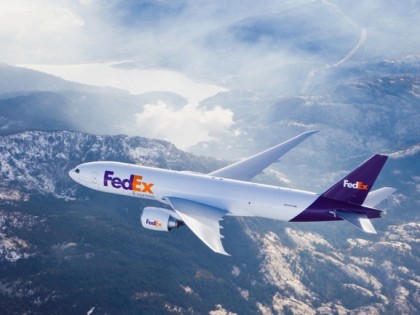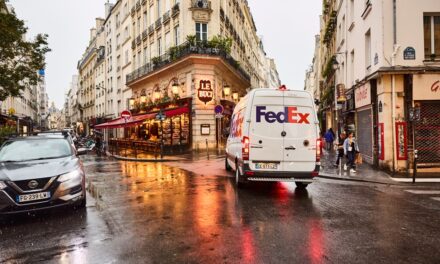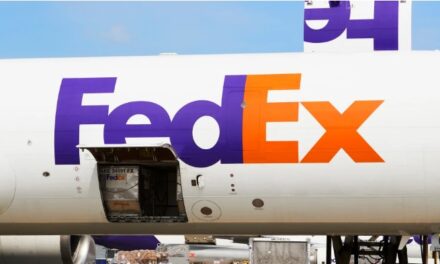
THE PURPLE PROMISE: FedEx Express in Europe and the Middle East
Mail & Express Review’s Chris Dolan poses the questions to Michael Holt, vice president of operations, Northern Europe, FedEx Express. CD: Across the world economic recovery is underway. Is this also applicable at FedEx Express in Europe? What differences do you see in different regions and countries?
MH: We’re certainly seeing continued growth of the FedEx Express business in Europe, which reflects the burgeoning strength of business recovery throughout the region. The European recovery is broadening; trade and shipping are more positive. For example, the eurozone economy grew by 1.7% in 2010 after a record contraction of 4.1% in 2009 when the financial crisis was taking its toll on the economy.
In particular, we’re seeing continued growth in our Central and Eastern European operations and as a result have made a number of strategic decisions. The most notable of these is the relocation of our Central and Eastern Europe hub from Frankfurt to Cologne last June, a joint investment by FedEx and Cologne Bonn Airport of €140m. FedEx Express staff count at the Cologne Bonn airport hub has grown rapidly from 35 to 450 employees and has created more than 150 new jobs.
The area within a radius of just 500km around Cologne generates over 40% of the entire gross domestic product of the European Union and it is a strategic gateway for Eastern Europe, so it is no surprise that we’ve invested heavily there.
CD: Has the recession altered your company’s long term aspirations?
MH: The recession made us focus even more on our customers’ needs by offering greater choice, more savings and a seamless shipping experience through our global network, which has put us in a strong position as we emerge from recession.
Strategically, and as part of FedEx Express long term approach, we’ve seen investment in the region as essential throughout the recession. We’ve kept one eye firmly on the bigger prize and have continued to expand our EMEA network through smart, strategic investments that offer solid potential for growth. For instance, FedEx Express has invested in new airplanes, such as the Boeing 777s and 757s, which offer significantly lower emissions with better service and range.

CD: What is the single most important objective for your business over the next twelve months? Is FedEx Express still treading carefully due to the delicate economic situation?
MH: In Europe we’re committed to our key goals: continuing to increase revenue; increasing earnings per share; improving cash flows; and increasing returns on invested capital. We’re optimistic about the future because our business strategy to profitably grow as a global business, and make sound investments, is working. In tandem, global macroeconomic trends are driving growth in markets offering unique competitive advantages, such as the nonstop flights being flown by our Boeing 777 freighters. In terms of anticipating changing economic conditions, we always ensure as a business we are prepared and ready for whatever may arise and we are constantly monitoring market conditions and anticipating any possible changes that will affect the business.
We are confident about growth in the region and as such we’ve continued making service enhancements to help achieve this. For example, in Eastern Europe we have enhanced services to Romania and Bulgaria within the last eighteen months, shortening transit times to reflect the need for countries in the region to benefit from the FedEx Express next day delivery services. We’ve also introduced a new connection between Asia and Europe with a direct roundtrip flight operating five days a week between Hong Kong and Paris that local customers can now take advantage of. FedEx Express has also just launched a new intercontinental flight route providing significant service improvements for customers shipping between the US, the Middle East, India and Europe.
CD: As FedEx Express develops its own ‘home market’ to what degree is it becoming a more distinctly European organisation as opposed to an American company in Europe?
MH: We see ourselves very much as being a global, rather than an American, company and regard Europe as being integral to our international network. Through our ‘people first’ philosophy, we have ensured that each region around the world has adopted its own unique and successful workplace culture that is distinct, rather than a bolt on to an American company.
As part of this we believe the growth of FedEx Express in Europe could not have been possible without the talented people we work with. We invest heavily in our staff and a series of initiatives has enabled us to develop employees through an extensive training and development programme, which ensures every member of the team understands the corporate philosophy and the importance placed upon the Customer Experience from the start.
The results speak for themselves. Across Europe, in countries including France, Germany, Spain and the UK, FedEx Express has received awards recognising it as a great place to work. For example, in the UK, FedEx Express was recently recognised by the Corporate Research Foundation Institute as one of Britain’s Top Employers for 2011. This really is a testament to our ability to integrate at a local level, while instilling the global FedEx culture and ‘people first’ philosophy.
CD: To what degree has FedEx Express in Europe grown through acquisition as opposed to organically? What sort of acquisitions have you made? What is the process for integrating them and ensuring the FedEx culture/ethos is instilled in the people?
MH: Over the years, we have expanded our service portfolio through extensive service enhancements and have undertaken a series of strategic acquisitions that have demonstrated our continued commitment to growing the business on a global scale.
In 2006, we acquired ANC Holdings Limited (ANC) in order to directly serve the entire UK domestic market. This acquisition was a particularly good fit for us as ANC shared similar values to FedEx. It too believed in providing excellent customer service, investing in team members and committing to being a good corporate citizen.
The following year, in 2007, we signed an agreement to acquire our Hungarian global service participant, Flying Cargo Hungary Kft. This marked an important step in our Eastern European expansion strategy, giving us a wholly owned operation in one of the region’s most dynamic markets.
Most recently, in the wider EMEA region, we acquired AFL Pvt. Ltd. and its affiliate, Unifreight India Pvt. Ltd. This acquisition enhanced our India business offerings and is a continuation of our long term commitment to the growing Indian market.
From an integration perspective, our Purple Promise programme, which stresses the importance of delivering outstanding customer experiences at the heart of everything we do, and rewarding and recognising our outstanding team members, has helped to ensure we continue to provide an excellent workplace environment. The multiple workplace awards we have won in the UK and across Europe demonstrate the impact of this programme at a global level and highlight how our culture is instilled across the world.
From an HR perspective, safeguarding this workplace ethos requires dedication and we ensure that the management is trained and supported in order that they feel comfortable and understand the values we are striving to communicate and instil.
CD: What would you say are the main differentiators between you and your global competitors such as UPS and DHL?
MH: We feel our philosophy of putting our people first is what makes us stand apart. We have made employees integral to our decision making process as we truly believe that, by empowering them to make decisions and having the freedom to think creatively, they will deliver the best possible service. We provide our employees with the skills needed to develop professionally by offering them training and rewarding those who offer excellent customer service though our Purple Promise programme.
We understand that a company is only as good as the people within it, which is why we invest huge amounts of resource and time building them up and training them.
We consistently outperform competitors in customer satisfaction surveys. The professionalism and attitude of our front line employees, especially couriers, is our strongest competitive differentiator.
We have also continued to improve customer access to new and emerging markets, while offering insight into accessing these through a campaign dedicated to offering solutions and advice called “FedEx Delivers to a Changing World”.
As a company we are renowned both across Europe, in the wider EMEA, and globally for the time definite, door to door, customs cleared international delivery service we deliver and our wide range of time sensitive shipments. We work hard to maintain our reputation for reliability, allowing customers to track the precise location of their packages by email, internet and phone.
CD: How is FedEx Express tapping into the explosive growth in e-commerce, particularly home delivery?
MH (pictured below): Over recent years, the growth in online shopping has brought tremendous benefits to both consumers and businesses. It has enabled consumers to acquire goods and services from across the globe and, by utilising the broad range of FedEx Express services, we have enabled businesses of all sizes across the globe to access markets that people would not have believed to be possible a short number of years ago.
FedEx Express facilitates this market segment by enabling companies located throughout Europe to sell products and services to the world.
Particularly, our aim is to help small business owners expand overseas from day one by helping them to navigate the global network and offering access to markets across the world. We have done this by offering SMEs tools such as FedEx Ship Manager Lite™, which is an easy to use, simplified online shipping tool that helps you to prepare a shipment, get rates and transit times and schedule a pick up. We are continuing to facilitate the way customers navigate this complex network having recently enhanced our critical inventory logistics service.

CD: Consumers are becoming more technically savvy and their demands are becoming more immediate. What recent investments has FedEx Express made in technology?
MH: FedEx Express is committed to innovation and has made a number of recent investments in technology that have allowed us to offer our customers smarter solutions for all their needs.
New technologies include Electronic Trade Documents, which allow customers to upload their international shipping documentation, reducing the need to print and sign multiple copies of documents and ultimately saving customers time and money. FedEx Express also launched two additional solutions designed to reduce the complexity of managing global logistics, the first being FedEx Critical Inventory Logistics®.
With FedEx Critical Inventory Logistics® customers worldwide can now track the status of orders, shipments and inventory levels by simply logging onto a web application on fedex.com. In addition, FedEx Critical Inventory Logistics® allows customers to centrally locate their most important inventory at stocking facilities throughout the world, including 24 hour locations. Many of these stocking facilities are located near hospitals, business centres and other strategic locations, enabling customers’ field representatives to pick up critical parts or devices at a moment’s notice. The use of regional and forward stocking locations for this service also allows customers to keep supplies accessible to support an increasingly mobile workforce.
We also offer FedEx Ship Manager Lite™, which is our newest online shipping solution designed for customers who ship infrequently. The tool, which allows customers to ship without having to register, has a simple, intuitive interface, providing customers with a quick and easy online shipping experience including internet and email tracking, an address book for frequent users wishing to access details quickly and FedEx’s new online shipment visibility application, FedEx InSight ®.
CD: Are there any particular areas that excite you for the future?
MH: We feel that Europe and the wider EMEA region have multiple opportunities for growth in the future. In particular, our expanded healthcare logistics offering has enabled us to become an integral supplier to the healthcare industry. As an integral supplier, and with our extensive industry supply chain, we can connect EMEA customers to businesses around the world. As the healthcare industry continues to see dynamic globalisation this is one area that continues to excite us with its possibilities.
In addition, the launch of a new intercontinental flight route in April between the US and Middle East is providing significant service improvements along with the best possible international connectivity. This announcement is one in a series of flight enhancements introduced by FedEx Express in EMEA to support increasing customer demand by adding capacity for key markets.
This, combined with the increased connectivity to Eastern Europe and the rest of the world with our Cologne Bonn Airport hub, is making it possible for us to extend our reach even further. Earlier this year, we launched five weekly direct flights between China and India to strengthen the burgeoning trade lane between India and Asia.
We also launched a new connection between Europe and Asia in 2010 with a direct round trip flight between Paris and Hong Kong.
This article was published in the June issue of Mail & Express Review. To subscribe to the magazine, click here.












